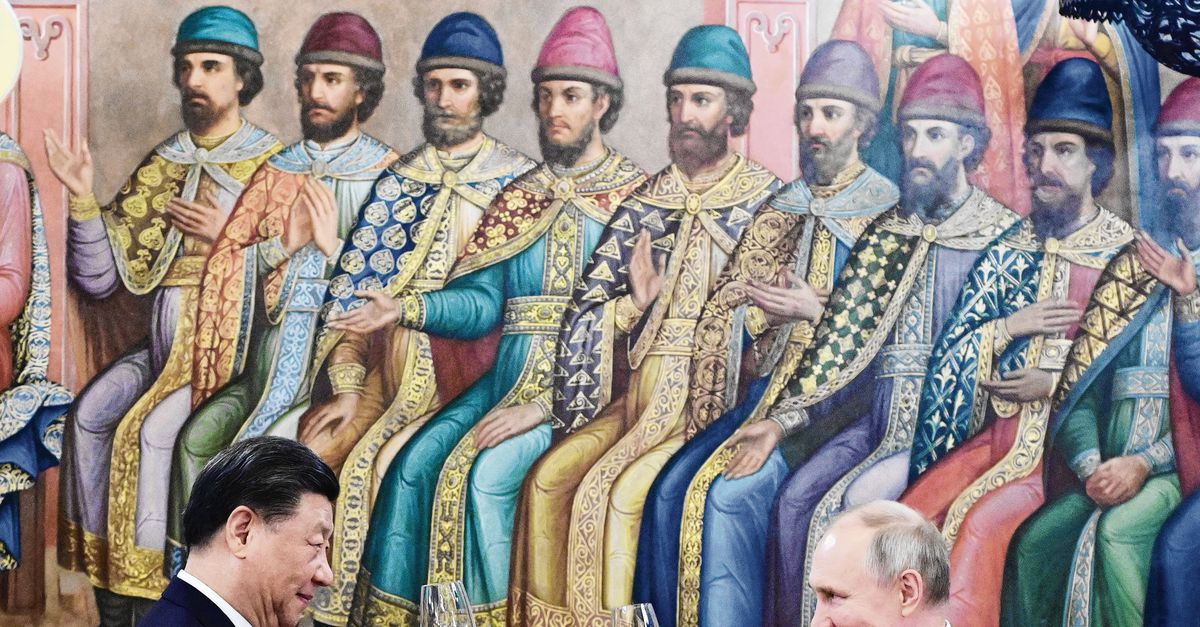Was it Siberian salmon? Sturgeon soup? Or venison with cherry sauce? After a state banquet in Moscow, Chinese President Xi Jinping bid a cordial farewell on Tuesday. “Changes are happening now that we haven’t seen in a hundred years,” he said in the entry. “And together we make these changes happen.”
With a classic country visit, China and Russia have confirmed their desire to get closer to each other. Russia can use a friend in the confrontation with the West over Ukraine. China is looking for partners to respond to the United States. Because, as Xi recently stated, they are trying to limit Beijing’s international influence.
Two days later, António Guterres, Secretary General of the United Nations, was invited to lunch with the leaders of European governments. Hard decisions were not on the agenda. The Brussels meeting was also an expression of solidarity.
EU leaders and Guterres stressed the importance of multilateralism, cooperation between many countries according to generally accepted rules. Multilateralism limits the power of large countries and gives small countries a stage. The European Union is a typical example of multilateralism. Guterres is the chair of global multilateralism.
“We are champions of multilateralism and sometimes we feel alone in it,” a senior EU official said in advance about the purpose of the visit. “I think Guterres also feels lonely sometimes.”
Multilateralism is the only way to address global problems. The UN’s Office of Scientific Climate showed again this week that climate action is vital. Babies who are born now will experience extreme heat in their lives.
With the war in Ukraine, the confrontation between China and the United States and the rise of authoritarian states, multilateralism is struggling. The postwar system of international consultations was able to bear fruit because one world power supported the system like an uncle benefactor and out of self-interest: the United States.
China and Russia no longer accept American supremacy and no longer believe in this world order. They see a world in which multiple centers of power emerge, a multipolar world. They also no longer adhere to the old standards.
Putin broke those rules by invading Ukraine. Xi this week honored a leader who not only invaded an independent country but was subject to an international arrest warrant issued by the International Criminal Court a few days earlier. Russia is said to have committed war crimes by deporting Ukrainian children. On the initiative of Poland and in cooperation with the United Nations, European Commission President Ursula von der Leyen announced Thursday that she will convene an international conference with the aim of tracing 16,200 children who have been deported.
Read also: Xi’s talks with Putin do not seem to bring peace in Ukraine closer
While the current regime is being defended in Brussels, Xi and Putin are building an alternative. China and Russia, in a detailed statement, agreed to want to cooperate in every imaginable field: technology, energy, raw materials, volunteering, disaster relief, oncology, psychiatry, sports, polar expeditions, naval vessels, and television shows.
The embrace seemed intimate, but they remained partners for their own interests. Negotiations on a new gas pipeline to bring Russian gas to China have not yet been completed, perhaps because China wants to impose more favorable terms than Russia, which has few options.
Some analysts felt that Russia sold its money to China at the top: Moscow supplies raw materials, among other things, but receives little in return. Russia expert Sam Green wrote on Twitter that Putin was “the Kremlin’s pledge to Beijing”.
The Sino-Russian Manifesto also reads as evidence of an authoritarian worldview. Moscow and Beijing are witnessing a “profound transformation in the international structure” with “the growth of a number of regional powers” that want to defend their “legitimate interests”. They oppose countries that “use democracy and freedom to put pressure on other countries.” They describe US President Joe Biden’s view that there is competition between democracy and authoritarianism as a bogus story.
They want their own system, with their own story. They write, without disclaimer, that they are committed to peace. And they allow themselves great freedom with the concept of democracy. For example, they advocate the “democratization of international relations.” If Putin takes it literally and follows the majority in the United Nations, he will have to leave Ukraine tomorrow.
Despite conflicting views around the world, international consultations have not completely stopped. For example, a number of European leaders are preparing to fly to Beijing. One of them is Josep Borrell, European Union foreign policy chief. He told a group of reporters on Friday that he saw Xi in Moscow this week and “wants to appear as someone who can play a diplomatic role.” This is why China talks about unlimited friendship with Russia, but does not want to get militarily involved with Ukraine. China must use its influence to make it clear to Russia that this war is not going anywhere and that it must withdraw its forces.”
As far as Borrell is concerned, China has not yet crossed any red lines in Ukraine.
A version of this article also appeared in the March 25, 2023 newspaper







